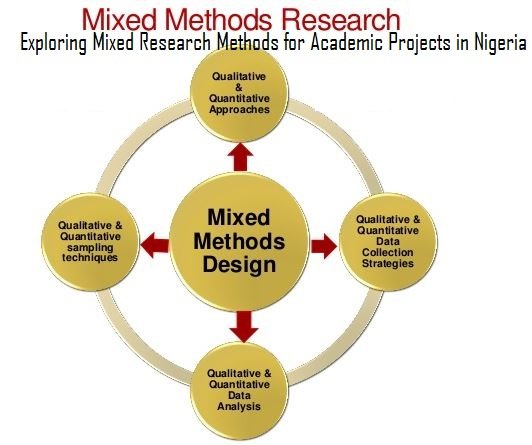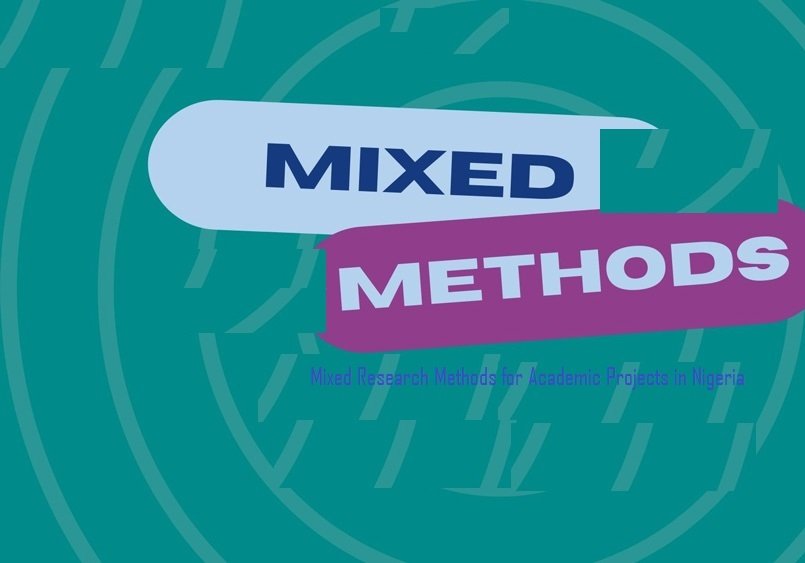- April 22, 2024
- Posted by: Igbaji Chinwendu
- Category: Project Writing Guide

Mixed Research Methods for Academic Projects in Nigeria
Contents
- 1 Mixed Research Methods for Academic Projects in Nigeria
- 1.1 Introduction
- 1.2 Significance for the application of the right research methods for academic projects in Nigeria.
- 1.3 Research Quality
- 1.4 Applicability to the Nigerian Context
- 1.5 Ethical Considerations
- 1.6 Policy Implications
- 1.7 Academic performance
- 1.8 Competitiveness
- 1.9 Benefits of Mixed Research Methods in Nigeria
- 1.10 Challenges of Adopting the Research Model
- 1.11 Applications in Nigeria academic institutions
- 1.12 When to use mixed research methods for academic projects in Nigeria
- 1.13 Complex Research Questions
- 1.14 Cultural Context Sensitivity
- 1.15 Longitudinal Studies
- 1.16 Conclusion
Introduction
The methodical and structured techniques used to look into and evaluate a certain issue or topic are known as academic research methods. In academia, a variety of research methodologies are employed, such as:
- Empirical Research: This kind of study uses methods such as experimentation, surveying, or observation to gather data. The social sciences, the natural sciences, and other disciplines where data can be gathered and examined frequently use empirical research, which is founded on actual evidence.
- Theoretical research: This is the creation and examination of theoretical frameworks or models to explain certain phenomena or concepts. In disciplines like philosophy, literature, and the social sciences, theoretical research is frequently employed.
- Qualitative Research: This kind of study involves gathering and examining non-numerical material, such as text, pictures, and firsthand accounts. It is frequently employed in the social sciences, anthropology, and other disciplines where the subject matter is intricate and challenging to measure.
- Quantitative study: This category of study entails gathering and evaluating numerical data, including statistics and experimental data. Quantitative research is frequently employed in the natural sciences, medicine, and other domains where numerical data may be gathered and examined.
- Mixed-methods Research: This style of research incorporates both qualitative and quantitative methodologies to provide a more thorough understanding of a specific topic or problem. It is frequently employed in disciplines like psychology, education, and the social sciences.
Significance for the application of the right research methods for academic projects in Nigeria.
Research methods are essential for educational projects in Nigeria since they offer a methodical approach to data collection, analysis, and interpretation. There are various reasons why it is important to employ appropriate research methods in Nigeria.
-
Research Quality
Employing suitable research methods ensures that academic projects in Nigeria adhere to standards. Researchers can provide legitimate and dependable results by using strict techniques that advance national knowledge.
-
Applicability to the Nigerian Context
Nigeria’s social, cultural, and economic aspects are distinctive. The proper use of research methods, therefore, guarantees that academic initiatives are customised to tackle problems unique to Nigeria, producing more significant results.
-
Ethical Considerations
Adherence to appropriate research procedures is required to maintain ethical standards in academic initiatives in Nigeria. Informed consent must be obtained, confidentiality must be maintained, and research participants’ rights must be upheld.
-
Policy Implications
Academic research projects’ conclusions are frequently used to guide policy choices. By employing the right research methodologies, Nigerian researchers can generate evidence-based data that can impact policies addressing many socioeconomic issues in the nation.
-
Academic performance
One factor contributing to Nigeria’s overall academic performance is the use of appropriate research methods. These methods help academics and students generate excellent work that satisfies global standards, improving the standing of Nigerian universities.

- Contribution to Knowledge Base
Appropriate research techniques enable the creation of fresh information and understandings pertinent to Nigeria’s progress. This helps the nation’s academic landscape expand in fields and disciplines.
-
Competitiveness
Nigerian researchers must use reliable research techniques in an increasingly globalised environment to maintain their standing in the global research arena. This is essential for international research funding opportunities and collaborations with foreign institutions.
Concept and use of mixed research methods for academic projects in Nigeria
The utilisation of mixed research methodologies in academic projects has garnered notable notice in Nigeria owing to its ability to thoroughly comprehend intricate research inquiries. Mixed research methods integrate qualitative and quantitative research methodologies in a single study.
With this approach, researchers can validate findings, triangulate data, and get a more comprehensive grasp of the research issue. The notion and application of mixed research methodologies hold significant significance in Nigerian academic domains, particularly in the social sciences, education, public health, and business administration disciplines.
Benefits of Mixed Research Methods in Nigeria
Using mixed research methodologies in academic projects in Nigeria offers several advantages, one of which is the capacity to approach research topics from various angles. With this method, researchers can obtain rich qualitative insights in addition to numerical data, resulting in a more thorough examination.
Furthermore, by enabling the validation of results through data triangulation, mixed techniques raise the general reliability and dependability of study findings. In the Nigerian setting, where various cultural and socioeconomic factors frequently impact research subjects, mixed techniques offer a sophisticated comprehension that corresponds with the intricacy of real-world realities.
Challenges of Adopting the Research Model
Although mixed research methodologies have many benefits, there are drawbacks when using them in Nigeria. Developing specialised training in qualitative and quantitative methodology, ensuring ethical issues are taken into account when using various data collection techniques, and successfully integrating various data sets during analysis are some of these obstacles. Moreover, time and resource restrictions can be major obstacles to conducting thorough mixed methods research in Nigeria.
Applications in Nigeria academic institutions
Nigerian universities and research institutions employ mixed research methods in numerous academic initiatives. For instance, in educational research, integrating focus group talks or in-depth interviews with survey data or results from standardised tests might yield a more nuanced understanding of educational practices and policies.
Similarly, combining qualitative community insights with quantitative epidemiological data in public health research can result in more effective health treatments customised for specific local situations.
When to use mixed research methods for academic projects in Nigeria
In Nigerian academic projects, mixed research methodologies can be effectively employed in the following scenarios:
-
Complex Research Questions
Using a combination of research methodologies can aid in delving deeper into the numerous facets of a topic when the research question is intricate and multifaceted. For instance, integrating quantitative surveys with qualitative interviews or focus groups can yield a more thorough understanding if the research’s goal is to investigate how cultural influences affect educational outcomes in Nigeria.
- Triangulation of conclusions
Mixed research methods are useful when researchers want to corroborate results from several approaches to triangulate their conclusions. This can be especially helpful in social science research conducted in Nigeria, where fusing quantitative data analysis with qualitative interpretation can increase the validity of the study’s conclusions.
-
Cultural Context Sensitivity
Given Nigeria’s rich cultural landscape, mixed research methodologies can ensure that the study is sensitive to the subtle cultural differences and contextual complexities of Nigerian society. Researchers can gain a more nuanced knowledge of social phenomena within particular cultural contexts by integrating qualitative methods like participant observation or ethnography with quantitative survey procedures.
-
Longitudinal Studies
Mixed research methods can help capture qualitative changes in attitudes, behaviours, and experiences as well as quantitative trends over time for academic projects needing longitudinal studies in Nigeria. This methodology would greatly benefit research on social transformation, public health initiatives, and developmental trajectories.
Conclusion
Mixed research methodologies can provide a thorough evaluation framework for academic projects that evaluate the effects of policies or interventions in Nigeria. Through integrating quantitative effect assessments and qualitative stakeholder viewpoints, students can offer evidence-based perspectives that are beneficial for the development and execution of policies.
Mixed research methods can improve data validity when conducting academic projects in Nigeria by enabling researchers to cross-validate their findings using various perspectives.
This is particularly crucial in disciplines like psychology, sociology, and anthropology where comprehending human experiences and behaviour necessitates a multidimensional perspective.
